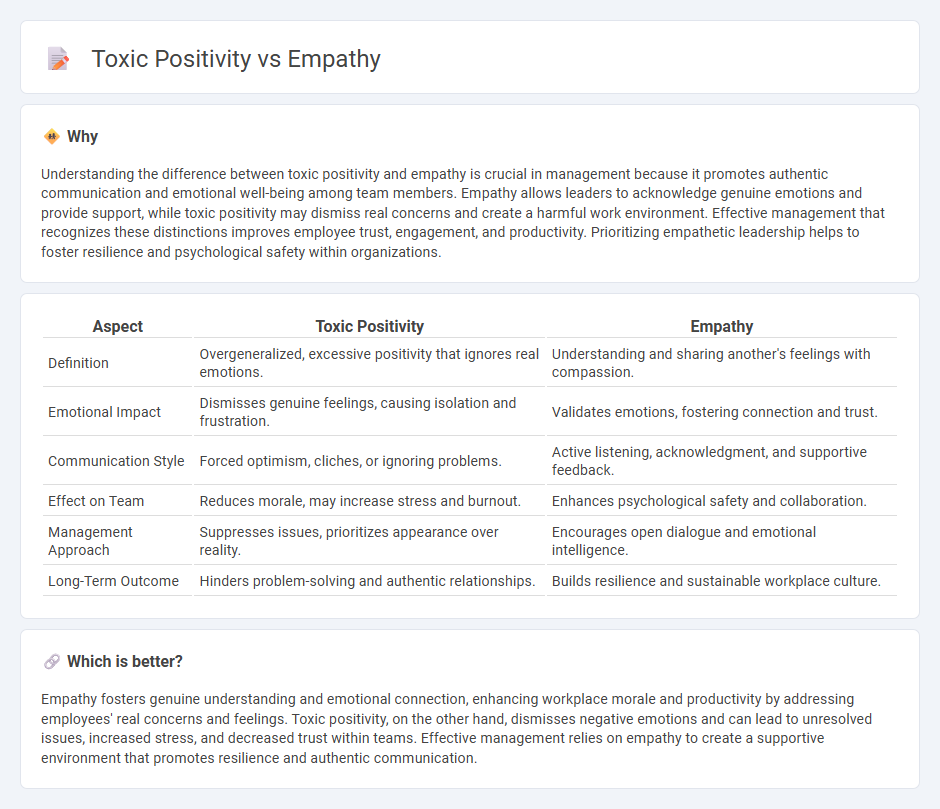
Toxic positivity in management promotes ignoring genuine emotions, leading to employee disengagement and reduced psychological safety. Empathy fosters understanding and support, improving team morale and productivity through authentic emotional acknowledgment. Explore effective management strategies to balance positivity and empathy for better workplace outcomes.
Why it is important
Understanding the difference between toxic positivity and empathy is crucial in management because it promotes authentic communication and emotional well-being among team members. Empathy allows leaders to acknowledge genuine emotions and provide support, while toxic positivity may dismiss real concerns and create a harmful work environment. Effective management that recognizes these distinctions improves employee trust, engagement, and productivity. Prioritizing empathetic leadership helps to foster resilience and psychological safety within organizations.
Comparison Table
| Aspect | Toxic Positivity | Empathy |
|---|---|---|
| Definition | Overgeneralized, excessive positivity that ignores real emotions. | Understanding and sharing another's feelings with compassion. |
| Emotional Impact | Dismisses genuine feelings, causing isolation and frustration. | Validates emotions, fostering connection and trust. |
| Communication Style | Forced optimism, cliches, or ignoring problems. | Active listening, acknowledgment, and supportive feedback. |
| Effect on Team | Reduces morale, may increase stress and burnout. | Enhances psychological safety and collaboration. |
| Management Approach | Suppresses issues, prioritizes appearance over reality. | Encourages open dialogue and emotional intelligence. |
| Long-Term Outcome | Hinders problem-solving and authentic relationships. | Builds resilience and sustainable workplace culture. |
Which is better?
Empathy fosters genuine understanding and emotional connection, enhancing workplace morale and productivity by addressing employees' real concerns and feelings. Toxic positivity, on the other hand, dismisses negative emotions and can lead to unresolved issues, increased stress, and decreased trust within teams. Effective management relies on empathy to create a supportive environment that promotes resilience and authentic communication.
Connection
Toxic positivity undermines genuine empathy by invalidating authentic emotional experiences, creating an environment where individuals feel pressured to display only positive emotions. Empathy requires acknowledging and validating both positive and negative feelings, fostering emotional understanding and psychological safety. Effective management promotes empathy by encouraging open communication and authentic emotional expression, counteracting the harms of toxic positivity in the workplace.
Key Terms
Emotional Intelligence
Empathy involves understanding and validating others' emotions, fostering genuine connection and emotional intelligence, while toxic positivity dismisses real feelings by insisting on a forced optimistic outlook. Emotional intelligence thrives on recognizing and processing a full range of emotions, promoting mental health and authentic relationships. Explore deeper insights into how empathy enhances emotional intelligence and combats toxic positivity for improved well-being.
Authentic Communication
Empathy involves genuinely understanding and validating another person's feelings, fostering trust and authentic communication, whereas toxic positivity dismisses real emotions by forcing an overly optimistic outlook that can alienate individuals. Authentic communication thrives on empathy's acceptance of vulnerability and complexity, creating a safe space for honest expression and deeper connections. Explore more about how empathy enhances relationships and counters toxic positivity for healthier interactions.
Psychological Safety
Empathy fosters psychological safety by validating emotions and creating a supportive environment where individuals feel heard and understood, which promotes authentic communication and trust. Toxic positivity undermines psychological safety by dismissing or minimizing negative feelings, leading to emotional suppression and increased stress. Explore how cultivating empathy over toxic positivity can enhance psychological well-being and foster genuine connections.
Source and External Links
Empathy vs. Sympathy - This article discusses the differences between empathy and sympathy, highlighting empathy as understanding and sharing feelings, while sympathy is more about feeling sorry for someone.
Empathy Definition - This resource defines empathy as the ability to sense and imagine others' emotions, differentiating between affective and cognitive empathy.
Empathy - This Wikipedia page provides a comprehensive overview of empathy, including its definition, types, and psychological aspects.
 dowidth.com
dowidth.com